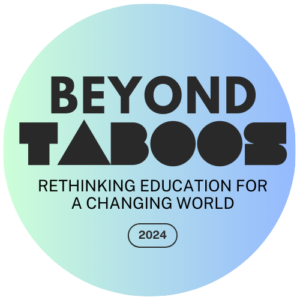The 20th Annual York University Graduate Student Conference in Education
May 6-8th, 2024 (Online)
Beyond Taboos: Rethinking Education for a Changing World
Register for the conference here!
Submit your conference paper to the YU-WRITE Journal!
“Naming things, breaking through taboos and denial is the most dangerous, terrifying, and crucial work. This has to happen in spite of political climates or coercions, in spite of careers being won or lost, in spite of the fear of being criticized, outcast or disliked. I believe freedom begins with naming things. Humanity is preserved by it.” - Eve Ensle
The 20th Annual York University Graduate Student Conference in Education will be taking place from May 6-8, 2024. This milestone year marks a bold exploration of uncharted territories within the field of education under the theme Beyond Taboos: Rethinking Education for a Changing World.
Theme Overview:
In the realm of education, we often encounter unspoken norms, silenced narratives, and forbidden territories. The theme of "Taboo" invites us to delve into the unconventional, challenging the status quo and questioning the boundaries of conventional educational discourse. This conference seeks to confront the uncomfortable, address silenced narratives, and provoke critical dialogue on the power dynamics, social constructs, and systemic structures that contribute to what is considered taboo in education.
Reimagining Education:
The prefix "Taboo" prompts us to reconsider, redefine, and reimagine our understanding of education. It signifies a space where we confront the uncomfortable and address the silenced narratives within our educational systems. The term "Taboo" invites us to delve into the forbidden, the unconventional, and the often overlooked aspects of education. In this liminal space, we challenge the norms and engage with topics that provoke, question, and push the boundaries of conventional educational discourse. Taboo is not just about breaking societal norms but also about understanding the power dynamics, social constructs, and systemic structures that contribute to what is considered taboo in education (Douglas, 2003). As Mary Douglas (2003) points out, the understanding of taboos in cultural and symbolic dimensions provides a way for societies to structure the world. She argues that societies use concepts of purity and danger to construct their understanding of the world. In this framework, taboos are mechanisms through which societies articulate and reinforce their values and norms.
Format of the Conference:
Embark on a three-day journey of innovation and inspiration at our dynamic online conference. Immerse yourself in thought-provoking panel discussions, enriching professional development sessions, and captivating presentations theme of Beyond Taboos.
Witness the power of creativity at our in-person art exhibit featuring Taboo-Breaking Creative Works. The exhibition promises an immersive experience (details to follow).
But the excitement doesn't end there! Join us for a lively social gathering post-conference, providing the perfect opportunity to unwind, connect with fellow participants, and celebrate the shared experiences of the event. Stay tuned for more details as we curate an unforgettable blend of online insights, real-world artistry, and post-conference camaraderie.
***For inquiries, please contact the Graduate Conference Coordinators at gradconf@edu.yorku.ca
Bibliography:
Alexander, J. C. (2004). Rethinking strangeness: From structures in space to discourses in civil society. Thesis Eleven, 79(1), 87–104. https://doi.org/10.1177/0725513604046959
Douglas, P. M. D., Mary. (2013). Purity and danger: An analysis of concepts of pollution and taboo. Routledge. https://doi.org/10.4324/9781315015811
Ensler, E. (2006, March 20). The power and mystery of naming things. NPR. https://www.npr.org/2006/03/20/5285531/the-power-and-mystery-of-naming-things
Farberow, N. L. (2014). Taboo topics. AldineTransaction.
Gozansky, Y. (2018). Showing puberty: Overcoming the taboo in children’s television. Sex Education, 18(5), 555–570. https://doi.org/10.1080/14681811.2018.1441019
Linder, S., & Majerus, E. (Eds.). (2016). Can I teach that? Negotiating taboo language and controversial topics in the language arts classroom. Rowman & Littlefield.


